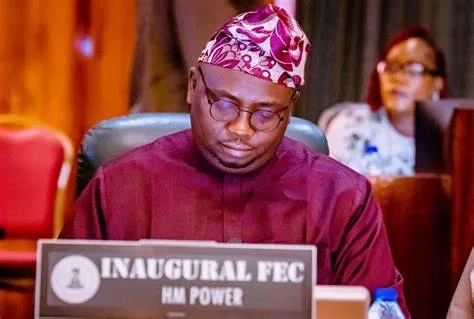The minister of Power, Adebayo Adelabu disclosed this when the director general, Infrastructure Concession Regulatory Commission (ICRC), Dr Jobson Ewalefoh, paid him a courtesy visit in Abuja.
The federal government has said it plans to engage the public-private-partnership to raise a portion of the $10 billion required to ensure 24-hour electricity supply across the country within the next five to 10 years.
Adelabu welcomed the ICRC’s initiative, acknowledging the government cannot singlehandedly fund the $10 billion needed for 24-hour power supply, especially with other sectors also requiring significant investment.
He noted the importance of maintaining government ownership while using private capital, adding that concessions are the ideal approach to achieve this balance.
“Achieving 24-hour power supply within 10 years requires a funding commitment of around $10 billion, which the government alone cannot provide,” said Adelabu.
“This is why we must partner with the private sector through PPPs, while retaining government interest.”
The meeting centred on addressing the significant financial and technical needs of Nigeria’s power sector through Public-Private Partnerships (PPP).
Both leaders noted the importance of leveraging private sector expertise and funding to boost power infrastructure, with a shared goal of achieving regular electricity supply nationwide.
Ewalefoh stressed the role of PPPs in addressing the power sector’s challenges, noting that while funding is essential, the issues are complex and multifaceted.
He pointed out that private sector collaboration would provide not only capital but also technical expertise necessary for optimising existing infrastructure and building new power assets.
“Revamping the power sector requires planning, investment, and time,” he said. “Government cannot fund it alone, so we must rely on the private sector’s financing capacity, which is why the ICRC was set up to regulate this leverage.
The DG added that ICRC’s regulatory framework aims to streamline the process of attracting PPP investment to the sector, thereby boosting foreign direct investment and driving economic growth.
Ewalefoh also revealed a new six-point policy from the ICRC, aimed at accelerating PPP investment and streamlining processes to fast-track project delivery.
He assured that while regulatory procedures have been simplified to encourage private sector involvement, stringent oversight remains in place to prevent delays and ensure that only capable firms engage in these partnerships.
The Commission includes conditions in PPP agreements where failure to meet these terms leads to automatic nullification.







![NAFDAC Withdraws, Suspends, Cancels Approval for multiple Medicine Products [Full List]](https://ideemlawful.com/wp-content/uploads/2024/12/NAFDAC-seizes-N107M-worth-of-illegal-drugs-in-Abuja-raid-5-e1733528657371.webp)

![Super Eagles squad for World Cup Qualifiers [Full List]](https://ideemlawful.com/wp-content/uploads/2025/03/images-2-24-75x75.jpeg)












